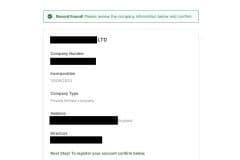Directors of newly incorporated UK companies are receiving official-looking letters from “Company Registry” requiring them to pay a fee. It’s a scam – and potentially a very lucrative one. We’ve looked into who’s behind it and identified one individual who the authorities should be questioning.
We frequently receive tip-offs from accountants and lawyers who’ve seen firms promoting dubious schemes of one kind or other. This often requires a large amount of analysis from us to work out exactly what’s going on.
But sometimes it’s obvious that what’s being proposed is wildly improper, even fraudulent. We’re publishing cases like this as “scam of the day” – documents and links plus a short explanation of why what’s proposed is a scam.
We hope that this helps warn potential clients off dangerous scams, and prompts the authorities to be more proactive identifying and closing down scammers.
The scam
If you incorporate a UK company, you are likely to receive a letter like this from “Company Registry” (company-registry.org):

It looks like an official document – an invoice for a service that has already been purchased (“Pending”, “Complete activation”, “These are the next steps”).
The reference to a “COVID 19 New Business Relief Deduction” again gives the impression this is an official letter.
If you go to the website to “activate your account”, everything continues to look official – entering your reference number reveals your company’s details, just as it would for a bona fide company registry:
But this is a scam, designed to look official but actually nothing to do with Companies House or HMRC.
The people behind the scam think putting this in small print on the back page absolves them of responsibility:

And there’s a disclaimer in very small print at the bottom of their website:

This doesn’t protect them at all. In fact the small print is damning, because it shows that the confusingly “official” presentation of the letter and website is by design.
Companies House has said this is a scam. So has the Association of Chartered Certified Accountants and many other people. We agree.
Could it be worse than a scam?
The “service” they are really selling is some kind of unspecified “document vault” in which companies can store their UTR (i.e. tax code), Government Gateway and Companies House authorisation codes.
This is information that would be extremely valuable to a fraudster, as it would enable them to make Companies House filings (e.g. installing themselves as directors and changing the registered office) and receive refunds from HMRC.
We don’t think anyone should be giving these details to any untrusted third party, and certainly not to the unknown individuals behind “company-registry.org”.
Who is behind company-registry?
The business is run by Company Registry LLC, which is registered in Arkansas, USA.
Very few details are publicly available for Arkansas companies:

The “Not Current” means that the company is late with its filings – it is (to use the US term) not in “good standing”.
The registered address is an office which used to be an accounting firm, but their website is down, their Facebook page hasn’t been updated for a year, and it’s unclear they’re still in business (although the realtors selling the building say that it’s let to an accounting firm). We wrote to them asking for comment and haven’t heard back.
We also wrote to Company Registry asking for comment, and received this “statement of deniability”:
The letter isn’t on headed notepaper, doesn’t identify the legal name of the business, is written in italics and is curiously worded (with signs that ChatGPT was used). We wrote to Company Registry LLC asking why they’d sent us such a strange letter, but didn’t hear back.1We know Company Registry received our message, because we pointed out they weren’t registered with the Information Commissioner, and they registered very soon after.
The letter is in the name of Octavian Balan who says he’s “legal counsel” but isn’t a qualified lawyer.2He told us he has a degree and a Masters in law, but Balan doesn’t seem to understand that doesn’t make him qualified.
Mr Balan has a LinkedIn page where he claims expertise across an impressive range of legal topics (“FCA related matters, crypto law, NFT law, tax law, VAT law, international law, fiscal law and corporate law”) and says he’s the founder and CEO of “global law firm” LegalX.3LegalX appears to have used a UK company in the past but now is an LLC incorporated in an unspecified jurisdiction. Its website says it’s a “reputable global law firm” and “global leader in litigation, arbitration and financial law” which is “comprised of elite lawyers with extensive legal experience”. Neither the website nor the LegalX LinkedIn or Facebook pages list any lawyers, or indeed any individuals other than Mr Balan. Neither Mr Balan nor LegalX is registered with the Solicitors Regulation Authority or any other regulator we’re aware of.4LegalX say they undertake UK litigation work (at £1,500 per hour); that is problematic, because the conduct of litigation is a “reserved legal activity” which is not permitted to be undertaken by a non-lawyer. LegalX says it has an office in Italy; the Italian prohibitions on non-lawyers practising are significantly more stringent than those in the UK.
Mr Balan denies running Company Registry and says he was just hired to act for it.5His explanation for his strange letter was “You do know that the right to expression exists, right? I can phrase a sentence however I prefer, thank you. That is the fundamental right to expression and to speech.“.
A criminal offence?
There is a specific criminal offence6In addition to general offences under the Fraud Act 2006. in the The Business Protection from Misleading Marketing Regulations 2008 for misleading advertising, meaning advertising which:
“in any way, including its presentation, deceives or is likely to deceive the traders to whom it is addressed or whom it reaches; and by reason of its deceptive nature, is likely to affect their economic behaviour”
We have heard from six people who were deceived by the mailshots from company-registry into thinking it was an invoice from an official body, and who went to the website and paid the fee.
So there are good grounds for believing a criminal offence has been committed. The offence carries a fine and/or imprisonment for up to two years.
There is a defence under the Regulations if a person can show they just made a mistake. That seems very unlikely given the small print – which even references the Regulations (presumably in an attempt to establish a defence; actually it does the opposite).
It is also possible that a tax offence is being committed. The fee charged by Company Registry LLC doesn’t include VAT, and a business with no UK establishment that sells digital services into the UK always has to be registered. If they have a UK establishment (e.g. because the business is actually run out of the UK) then the registration requirement would apply if their sales hit £90,000.
What should happen?
This is a large scale and well organised fraud, targeting many (and perhaps every) newly incorporated UK company.
We would hope that it is being investigated as a priority. The obvious first step would be to speak to Mr Balan. Given he isn’t a qualified lawyer7Or supervised by a qualified lawyer, his communications with Company Registry LLC aren’t subject to legal privilege.
Many thanks to the individuals and businesses who alerted us to this fraud.
- 1We know Company Registry received our message, because we pointed out they weren’t registered with the Information Commissioner, and they registered very soon after.
- 2He told us he has a degree and a Masters in law, but Balan doesn’t seem to understand that doesn’t make him qualified.
- 3LegalX appears to have used a UK company in the past but now is an LLC incorporated in an unspecified jurisdiction.
- 4LegalX say they undertake UK litigation work (at £1,500 per hour); that is problematic, because the conduct of litigation is a “reserved legal activity” which is not permitted to be undertaken by a non-lawyer. LegalX says it has an office in Italy; the Italian prohibitions on non-lawyers practising are significantly more stringent than those in the UK.
- 5His explanation for his strange letter was “You do know that the right to expression exists, right? I can phrase a sentence however I prefer, thank you. That is the fundamental right to expression and to speech.“.
- 6In addition to general offences under the Fraud Act 2006.
- 7





14 responses to “Scam of the day: the fake “company-registry” preying on new companies”
this person has had a few “businesses” aside from this scam. Look into “Aura Collection Co” (company’s facebook is still up), “Get Peachy Fit” (@getpeachyfit instagram) and @alarapilates also on instagram.
Hi Dan
New letter out there and I have emailed it to you.
Dan, you’d be interested to know that the registered agent, Kitta Sourinphoumy now goes by Kitta Smith. The aforementioned was her maiden name. Elefante was her prior married name (divorced) she married a UK man by the name of Owen Smith and he had once boasted having a saas portfolio in the bio of his Instagram, which he conveniently deleted. The Instagram of these scammers are: @kittaxsmith and @owen.knows. They’ve just recently gone private. Their newest scam venture is selling Pilates grip socks in palm beach, Miami. @alarapilates
Dan, the scammers are moving quick and privating/deleting things. In case you’re unable to look further into Kitta Smith/Sourinphoumy/Elefante’s business wrongdoings, please check out the instagram account, @kittaxscammer.
If they’re a non-UK based company, with no physical presence or management decisions in the UK, then wouldn’t the VAT threshold be £0? Any trade, they should be registered.
you’re quite right – my assumption is that this is actually being run from the UK, but I could easily be wrong. I’ll amend the text.
We regularly receive similar scams in relation to ICO and Trade Mark renewals.
Dan,
The Arkansas registration document shows two spellings of the same name viz
Reg. Agent KITTA SOURNPHOUMY
Officer KITTA SOURINPHOURNY Incorporator
How odd, he seems unsure who he is.
Is hard to find info but 2 weak points for this site are :-
1. They are using Cloudflare to mask real IP. Name Server: alberto.ns.cloudflare.com
Cloudflare is used to stop hackers and assume they would not want to be associated with scams. Can be reported here https://www.cloudflare.com/en-gb/trust-hub/reporting-abuse/
2. Credit Card Processor – If anyone who has fallen for scam contacts their card company you may be able to find which company is processing their payments and again get it blocked. Companies like e.g. Stripe/ Worldpay / Paypal they would not want to be associated with this type of transaction.
Thanks. I’ve asked Stripe for comment.
Could this fall under US wire fraud?
Great stuff Dan and team
This is not dissimilar to the Fax Directory Scam of the early 1990s where an order/ invoice was sent through and was inadvertently signed up to.
Hi Dan,
I’m not sure the £90,000 VAT registration limit would apply to them as they are overseas. If they are a NETP (non established taxable person), any sales they make in the UK would make them liable to be registered from day 1?
kind regards
Gareth